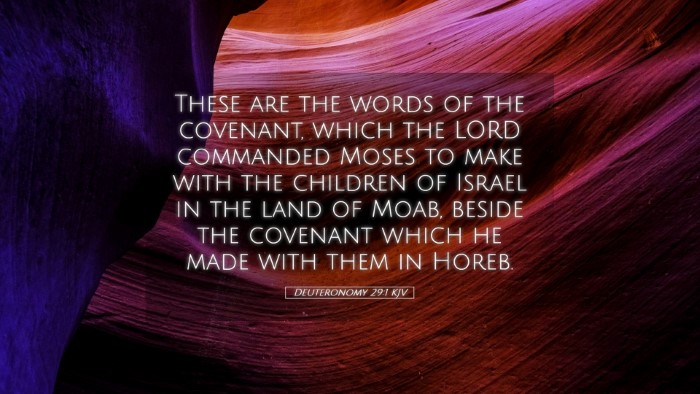Commentary on Deuteronomy 29:1
Verse: "These are the words of the covenant which the LORD commanded Moses to make with the children of Israel in the land of Moab, beside the covenant which he made with them in Horeb."
Introduction
Deuteronomy 29:1 serves as a pivotal verse that links the past covenant at Horeb with the new covenant being established in Moab. It highlights the continuity of God's promises and the significance of covenant renewal as the Israelites prepare to enter the Promised Land. This commentary draws insights from renowned public domain commentaries, drawing upon the theological richness necessary for pastors, students, and scholars.
Contextual Analysis
Historical Background: The Israelites are poised to enter the Promised Land after a prolonged period of wandering in the wilderness. The book of Deuteronomy is essentially a series of speeches by Moses that reiterate God's laws and the covenant relationship established with His people.
The Covenant Significance: The term "covenant" is crucial as it denotes a legal agreement between God and Israel, marked by obligations on both sides. The previous covenant made at Horeb was a formal establishment of this relationship, while the covenant in Moab serves to re-affirm and renew their commitment as they stand on the brink of new beginnings.
Theological Insights
-
Divine Sovereignty:
Matthew Henry emphasizes God’s control over the events taking place. The covenant reflects not only a promise but the orderly unfolding of divine plan wherein God actively engages with His people. This sovereignty assures them of God's presence as they face new challenges.
-
Human Responsiveness:
Albert Barnes notes that the covenant requires an active response from the people of Israel. Their acceptance and adherence to the sacred agreements are crucial for their relationship with the Lord. This highlight serves as a reminder that divine promises require human faithfulness.
-
Unified Community:
Adam Clarke reflects the importance of the collective aspect of covenant making. The language of “children of Israel” reinforces a communal identity. It affirms that the covenant is not just an individual engagement but a binding agreement for the entire community of faith.
Key Themes
-
Renewal and Commitment:
The act of renewing the covenant signifies a fresh commitment to God’s laws. It underscores the necessity of regular spiritual renewal, allowing the faithful to reconnect with their divine purpose.
-
Memory and Reflection:
The location of the renewal in Moab serves as a historical reminder. Reflecting on past experiences helps the Israelites understand their identity and the consistency of God’s faithfulness through their journey.
-
Covenantal Blessings and Curses:
Embedded within this renewal process are the blessings for obedience and the repercussions of disobedience. It underscores the serious implications of their covenantal relationship with God, challenging the faithful to align their actions with divine expectations.
Practical Applications
-
For Pastors:
This text calls for pastoral reflection on the importance of covenant renewal within congregational life. It encourages leaders to facilitate moments of recommitment to God’s ways, fostering a community engaged in collective discipleship.
-
For Theological Students:
Students can examine the implications of covenant theology in broader biblical contexts and the continuity of God's redemptive plan through history. The lessons from this verse challenge scholars to engage critically with scripture and tradition.
-
For Bible Scholars:
This verse invites critical examination of the textual structure and themes in Deuteronomy, reinforcing the need to explore the nuances of covenant relationships in the Old Testament and their theological implications for New Testament theology.
Conclusion
In Deuteronomy 29:1, the intersection of God's sovereignty and human agency is poignantly encapsulated in the renewal of covenant. This verse is a clarion call for reflection on spiritual fidelity, community identity, and the continual need for God's people to dwell in His presence. By examining this text through the lenses provided by historical context and theological reflection, we uncover profound principles that challenge and inspire today’s believers in their walk of faith.


